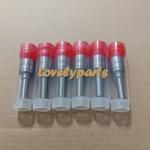Information injection-pump assembly
ZEXEL
101606-9290
1016069290

Rating:
Service parts 101606-9290 INJECTION-PUMP ASSEMBLY:
1.
_
7.
COUPLING PLATE
8.
_
9.
_
11.
Nozzle and Holder
12.
Open Pre:MPa(Kqf/cm2)
21.6{220}
15.
NOZZLE SET
Cross reference number
ZEXEL
101606-9290
1016069290
Zexel num
Bosch num
Firm num
Name
Calibration Data:
Adjustment conditions
Test oil
1404 Test oil ISO4113 or {SAEJ967d}
1404 Test oil ISO4113 or {SAEJ967d}
Test oil temperature
degC
40
40
45
Nozzle and nozzle holder
105780-8140
Bosch type code
EF8511/9A
Nozzle
105780-0000
Bosch type code
DN12SD12T
Nozzle holder
105780-2080
Bosch type code
EF8511/9
Opening pressure
MPa
17.2
Opening pressure
kgf/cm2
175
Injection pipe
Outer diameter - inner diameter - length (mm) mm 6-2-600
Outer diameter - inner diameter - length (mm) mm 6-2-600
Overflow valve
131424-5120
Overflow valve opening pressure
kPa
255
221
289
Overflow valve opening pressure
kgf/cm2
2.6
2.25
2.95
Tester oil delivery pressure
kPa
157
157
157
Tester oil delivery pressure
kgf/cm2
1.6
1.6
1.6
Direction of rotation (viewed from drive side)
Right R
Right R
Injection timing adjustment
Direction of rotation (viewed from drive side)
Right R
Right R
Injection order
1-5-3-6-
2-4
Pre-stroke
mm
4.5
4.45
4.55
Beginning of injection position
Governor side NO.1
Governor side NO.1
Difference between angles 1
Cal 1-5 deg. 60 59.5 60.5
Cal 1-5 deg. 60 59.5 60.5
Difference between angles 2
Cal 1-3 deg. 120 119.5 120.5
Cal 1-3 deg. 120 119.5 120.5
Difference between angles 3
Cal 1-6 deg. 180 179.5 180.5
Cal 1-6 deg. 180 179.5 180.5
Difference between angles 4
Cyl.1-2 deg. 240 239.5 240.5
Cyl.1-2 deg. 240 239.5 240.5
Difference between angles 5
Cal 1-4 deg. 300 299.5 300.5
Cal 1-4 deg. 300 299.5 300.5
Injection quantity adjustment
Adjusting point
-
Rack position
9.6
Pump speed
r/min
700
700
700
Each cylinder's injection qty
mm3/st.
112
109.2
114.8
Basic
*
Fixing the rack
*
Standard for adjustment of the maximum variation between cylinders
*
Injection quantity adjustment_02
Adjusting point
C
Rack position
8+-0.5
Pump speed
r/min
225
225
225
Each cylinder's injection qty
mm3/st.
18.5
15.7
21.3
Fixing the rack
*
Standard for adjustment of the maximum variation between cylinders
*
Injection quantity adjustment_03
Adjusting point
A
Rack position
R1(9.6)
Pump speed
r/min
700
700
700
Average injection quantity
mm3/st.
112
111
113
Basic
*
Fixing the lever
*
Injection quantity adjustment_04
Adjusting point
B
Rack position
R1(9.6)
Pump speed
r/min
1100
1100
1100
Average injection quantity
mm3/st.
113.5
111
116
Difference in delivery
mm3/st.
9
9
9
Fixing the lever
*
Timer adjustment
Pump speed
r/min
950--
Advance angle
deg.
0
0
0
Remarks
Start
Start
Timer adjustment_02
Pump speed
r/min
900
Advance angle
deg.
0.5
Timer adjustment_03
Pump speed
r/min
1150
Advance angle
deg.
4.5
4
5
Remarks
Finish
Finish
Test data Ex:
Governor adjustment
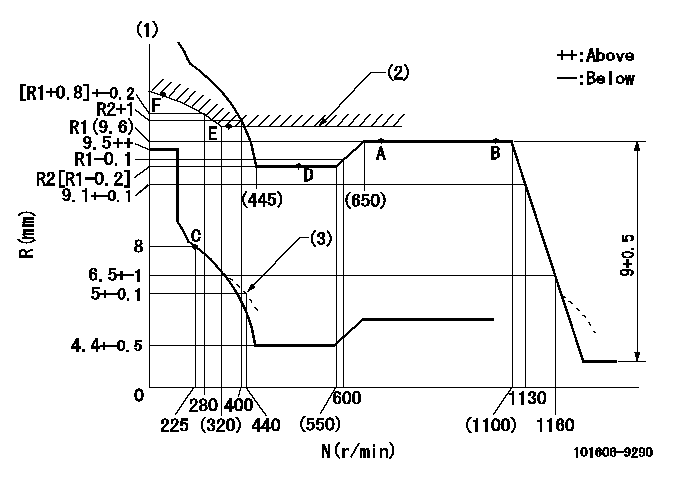
N:Pump speed
R:Rack position (mm)
(1)Tolerance for racks not indicated: +-0.05mm.
(2)Excess fuel setting for starting: SXL (N = N1)
(3)Damper spring setting
----------
SXL=(R1+0.3)+0.2mm N1=350r/min
----------
----------
SXL=(R1+0.3)+0.2mm N1=350r/min
----------
Speed control lever angle
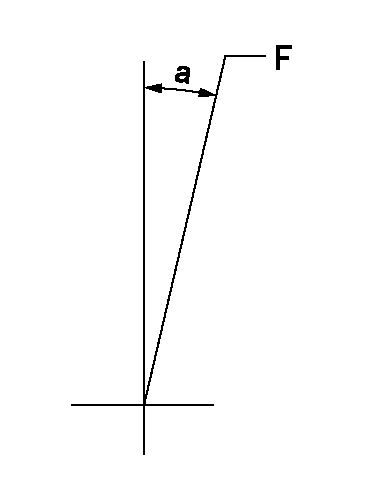
F:Full speed
----------
----------
a=5.5deg+-5deg
----------
----------
a=5.5deg+-5deg
0000000901
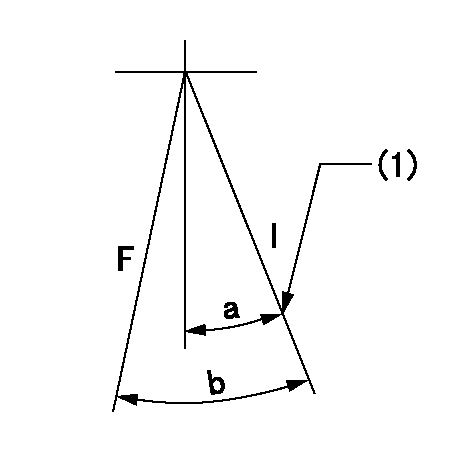
F:Full load
I:Idle
(1)Stopper bolt setting
----------
----------
a=7.5deg+-5deg b=18.5deg+-3deg
----------
----------
a=7.5deg+-5deg b=18.5deg+-3deg
Stop lever angle
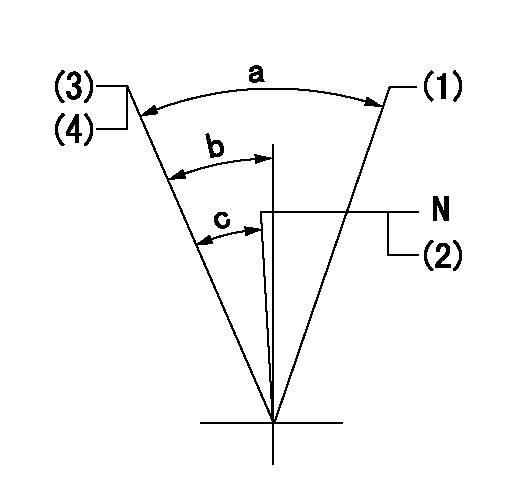
N:Engine manufacturer's normal use
(1)Free (at delivery)
(2)Rack position = aa
(3)Rack position bb
(4)Stopper bolt setting
----------
aa=13.5mm bb=6-0.5mm
----------
a=(52deg) b=30deg+-5deg c=24deg+-5deg
----------
aa=13.5mm bb=6-0.5mm
----------
a=(52deg) b=30deg+-5deg c=24deg+-5deg
0000001501 MICRO SWITCH
Adjustment of the micro-switch
Adjust the bolt to obtain the following lever position when the micro-switch is ON.
(1)Speed N1
(2)Rack position Ra
----------
N1=325r/min Ra=7.3+-0.1mm
----------
----------
N1=325r/min Ra=7.3+-0.1mm
----------
Timing setting
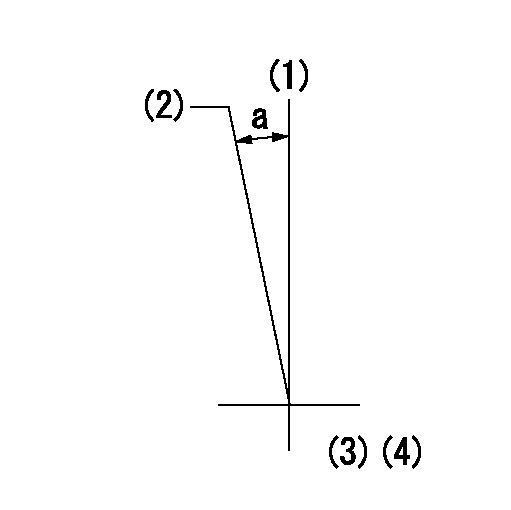
(1)Pump vertical direction
(2)Coupling's key groove position at No 1 cylinder's beginning of injection
(3)B.T.D.C.: aa
(4)-
----------
aa=15deg
----------
a=(7deg)
----------
aa=15deg
----------
a=(7deg)
Information:
P-305: No Or Poor Response To Throttle
Probable root causes:* Active Diagnostic Codes* PEEC III Self-Checks or Cold Mode (normal operation)* Progressive Shift Parameters (normal operation)* Throttle position signal* Rack subsystem* Vehicle speed signalPerform the following tests in order:1. Troubleshoot any ACTIVE diagnostic codes.2. Verify that PEEC III has completed its startup self-checks and is out of cold mode.3. Check Progressive Shift Parameters to verify that they are not the cause of the complaint.4. P-502: Throttle Position Sensor Test5. P-521: Rack Position Sensor Test6. P-523: Rack Solenoid (BTM) Test7. P-504: Vehicle Speed Signal TestP-306: Low Power/Engine RPM Restricted/Will Not Reach VSL
Probable root causes:* Active Diagnostic Codes* Customer Parameters (normal operation)* PEEC III Self-Checks or Cold Mode (normal operation)* Throttle position signal* Fuel supply restrictions* Inlet air system problems* Exhaust system restrictions* Boost pressure signals* Rack controls* Timing advance* Vehicle speed signalPerform the following tests in order:1. Troubleshoot any ACTIVE or LOGGED diagnostic codes. * Code 24, 46, and 48 limit engine speed to 1350 rpm.* Code 36 limits engine speed to "Engine RPM At VSL".* Codes 22, 23, 25, 43, 44 limit engine power.2. Verify that the complaint is NOT due to parameters. * Check Progressive Shift Parameters, Vehicle Speed Limit, and Top Engine Limit.* Verify that Full Load Setting and Full Torque Setting are programmed to the values stamped on the engine information plate.3. Verify that PEEC III has completed its startup self-checks and is out of cold mode.4. P-502: Throttle Position Sensor Test5. Check for proper fuel pressure/fuel return flow.6. Check for air system problems: * Plugged air filter* Aftercooler restrictions* Aftercooler leaks* High intake air temperature7. Check for exhaust system restrictions8. P-514: Boost Pressure Sensor Test9. P-520: Dynamic Rack Controls Test10. P-533: Dynamic Injection Timing Test11. P-504: Vehicle Speed Signal TestP-307: Cruise Or PTO Does Not Function
Probable root causes:* Active Diagnostic Codes* Customer Parameters (normal operation)* Cruise/PTO Switches* Vehicle speed signalPerform the following tests in order:1. Troubleshoot any ACTIVE diagnostic codes.2. Check High/Low Cruise Limit and Vehicle Speed Calibration.3. P-505: Cruise Control and PTO Switches Test4. P-506: Service Brake and Clutch Switches Test5. P-504: Vehicle Speed Signal TestP-308: Intermittent Engine Shutdowns
Use this procedure ONLY if the engine shut down completely and had to be restarted using the keyswitch. Probable root causes:* Poor connection* Battery power or ground to ECM (vehicle wiring)* After Market engine protection devices (PEEC III does not have engine protection shutdown feature)* Fuel supply* Shutoff solenoid* Shorted 8 volt sensor supply voltage* Rack controls* Engine speed sensor* ECM or Personality ModulePerform the following steps in order:1. Check external PEEC III wiring harness and connectors (refer to P-500: Inspecting Electrical Connectors): * ECM (J4/P4) and Vehicle (J7/P7) connectors.* Transducer connector (J5/P5)* Rack solenoid connector (J3/P3)* Shutoff solenoid connector (J13/P13)2. P-501: Electrical Power Supply Test3. Check for correct installation and operation of engine protection devices.4. P-513: Shutoff Solenoid5. Check fuel tanks and lines for foreign objects which may block fuel supply.6. Bypass OEM wiring and shutdown devices for testing (refer to P-501: Electrical Power Supply
Probable root causes:* Active Diagnostic Codes* PEEC III Self-Checks or Cold Mode (normal operation)* Progressive Shift Parameters (normal operation)* Throttle position signal* Rack subsystem* Vehicle speed signalPerform the following tests in order:1. Troubleshoot any ACTIVE diagnostic codes.2. Verify that PEEC III has completed its startup self-checks and is out of cold mode.3. Check Progressive Shift Parameters to verify that they are not the cause of the complaint.4. P-502: Throttle Position Sensor Test5. P-521: Rack Position Sensor Test6. P-523: Rack Solenoid (BTM) Test7. P-504: Vehicle Speed Signal TestP-306: Low Power/Engine RPM Restricted/Will Not Reach VSL
Probable root causes:* Active Diagnostic Codes* Customer Parameters (normal operation)* PEEC III Self-Checks or Cold Mode (normal operation)* Throttle position signal* Fuel supply restrictions* Inlet air system problems* Exhaust system restrictions* Boost pressure signals* Rack controls* Timing advance* Vehicle speed signalPerform the following tests in order:1. Troubleshoot any ACTIVE or LOGGED diagnostic codes. * Code 24, 46, and 48 limit engine speed to 1350 rpm.* Code 36 limits engine speed to "Engine RPM At VSL".* Codes 22, 23, 25, 43, 44 limit engine power.2. Verify that the complaint is NOT due to parameters. * Check Progressive Shift Parameters, Vehicle Speed Limit, and Top Engine Limit.* Verify that Full Load Setting and Full Torque Setting are programmed to the values stamped on the engine information plate.3. Verify that PEEC III has completed its startup self-checks and is out of cold mode.4. P-502: Throttle Position Sensor Test5. Check for proper fuel pressure/fuel return flow.6. Check for air system problems: * Plugged air filter* Aftercooler restrictions* Aftercooler leaks* High intake air temperature7. Check for exhaust system restrictions8. P-514: Boost Pressure Sensor Test9. P-520: Dynamic Rack Controls Test10. P-533: Dynamic Injection Timing Test11. P-504: Vehicle Speed Signal TestP-307: Cruise Or PTO Does Not Function
Probable root causes:* Active Diagnostic Codes* Customer Parameters (normal operation)* Cruise/PTO Switches* Vehicle speed signalPerform the following tests in order:1. Troubleshoot any ACTIVE diagnostic codes.2. Check High/Low Cruise Limit and Vehicle Speed Calibration.3. P-505: Cruise Control and PTO Switches Test4. P-506: Service Brake and Clutch Switches Test5. P-504: Vehicle Speed Signal TestP-308: Intermittent Engine Shutdowns
Use this procedure ONLY if the engine shut down completely and had to be restarted using the keyswitch. Probable root causes:* Poor connection* Battery power or ground to ECM (vehicle wiring)* After Market engine protection devices (PEEC III does not have engine protection shutdown feature)* Fuel supply* Shutoff solenoid* Shorted 8 volt sensor supply voltage* Rack controls* Engine speed sensor* ECM or Personality ModulePerform the following steps in order:1. Check external PEEC III wiring harness and connectors (refer to P-500: Inspecting Electrical Connectors): * ECM (J4/P4) and Vehicle (J7/P7) connectors.* Transducer connector (J5/P5)* Rack solenoid connector (J3/P3)* Shutoff solenoid connector (J13/P13)2. P-501: Electrical Power Supply Test3. Check for correct installation and operation of engine protection devices.4. P-513: Shutoff Solenoid5. Check fuel tanks and lines for foreign objects which may block fuel supply.6. Bypass OEM wiring and shutdown devices for testing (refer to P-501: Electrical Power Supply
